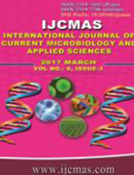


 National Academy of Agricultural Sciences (NAAS)
National Academy of Agricultural Sciences (NAAS)

|
PRINT ISSN : 2319-7692
Online ISSN : 2319-7706 Issues : 12 per year Publisher : Excellent Publishers Email : editorijcmas@gmail.com / submit@ijcmas.com Editor-in-chief: Dr.M.Prakash Index Copernicus ICV 2018: 95.39 NAAS RATING 2020: 5.38 |
Worldwide indiscriminate uses of antibiotics to control pathogenic bacteria have led to the spread of the resistant strains of microorganisms making treatment of bacterial infections by these drugs difficult. Thus scientists are in search of safe alternative therapies against these dangerous and even life threatening pathogens. Plants produce many phytochemicals having antimicrobial properties. These may be used as natural drugs which are generally nontoxic and less expensive than the synthetic drugs. In this present study, with the help of agar well diffusion method, an attempt was made to find out antimicrobial properties of the juices of some common edible Citrus and non Citrus fruits against five pathogenic bacteria. It was observed that E. coli was the only bacteria that was inhibited by all fruit juices. Citrus fruit juices appeared to be more efficient than non Citrus fruits in inhibiting microorganisms as they created larger zones of inhibitions in agar plates inoculated with bacterial species both in crude and diluted state. Among the all fruit juices tested, lemon juice was the most efficient that inhibited all five bacteria equally well both in crude and diluted states. Limited qualitative phytochemical analysis of fruit juices revealed that the juice of the Citrus fruit carambola contained majority, i.e. three out four phytochemicals tested. Results of our study indicated that Citrus fruits act as very potent natural antibacterial agents and may act as cheap resources of prophylaxis against potential pathogenic microorganisms for the benefit of the people of developing world where huge medical cost is a burden in the societies.
 |
 |
 |
 |
 |